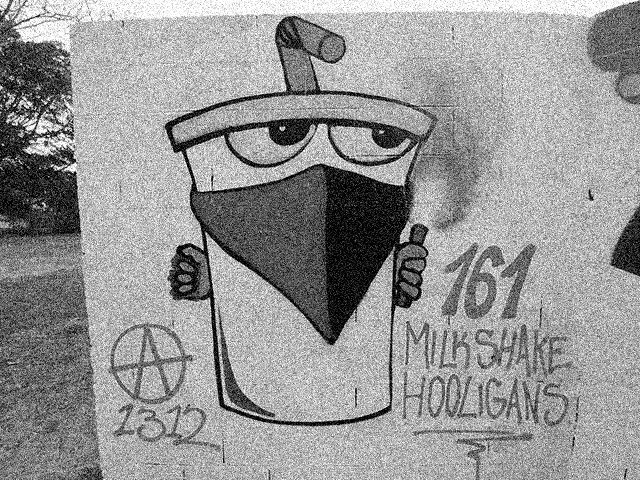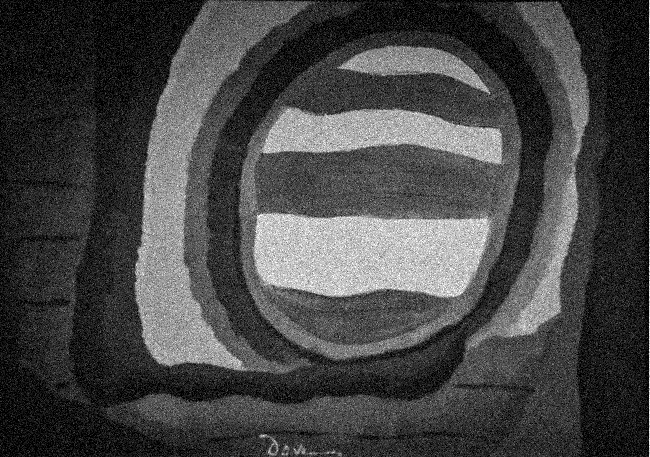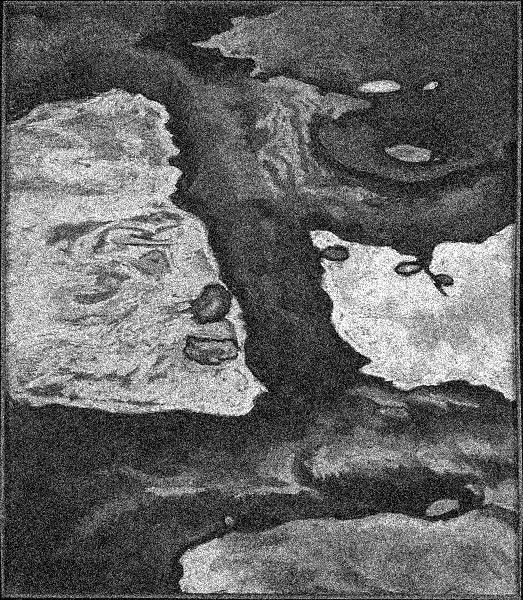Masochistic Milkshake Martyrs
On the very stable BDSM relationship between the Proud Boys and antifa.

In the Guardian, Jason Wilson considers the question of why so many far-right rallies seem to be taking place in, of all places, Portland, Oregon—home of “hipsters, cyclists, and fussy diners.” Obviously, he can’t ignore “the long racist history in the Pacific north-west that made Portland the whitest major city in America,” but the general explanation he arrives at is geographical rather than historical. “The Oregon hinterland,” he notes, “is deeply conservative.” The liberal coast is a placid green bayroot scum that blankets a dark ocean of racial resentments out in hick country; invisible, until a particularly strong current from the furthest depths breaks through the surface.
It’s an elegant image, and I’m not saying it’s entirely incorrect. But it’s strange to see one thing missing entirely from Wilson’s survey of the situation: the fact that in Portland, probably more than anywhere else in the country, any street activity by polo-shirted chauvinists is guaranteed to be met with an energetic and hostile response. If you try to organise a Proud Boys rally there, someone will try to hit you—and the Proud Boys would like to be hit. I don’t mean that they’re looking for violence as a shortcut to publicity. These people are not like—for instance—Milo Yiannopoulos, who leveraged street protest into an entirely undeserved notoriety (while being far too sane to allow anyone to actually damage his expensive clothes or his expensive face). It’s deeper than that, seedier and less political. The Proud Boys would like someone to hit them; they want someone to touch their skin at high speed and with great force, because these people are masochists.
Here is a Proud Boy initiation ritual. A slightly gormless man stands in the middle of a circle of other slightly gormless men: patchy goatees, baseball caps, blue jeans slipping down over ash-white arses. “I am a proud western chauvinist,” he intones, “and I refuse to apologise for creating the modern world.” (Around him, the modern world limps into catatonia. Vape clouds melt into the blank grey sky. There’s a Chipotle on the corner, and all the trees are dying.) Then the circle around him starts pummelling the initiate in his chest and shoulders. There’s a lot of pent-up anger here, but these people aren’t natural brawlers. They swing their arms from side to side, shoulder-blades wobbling under jellied flesh. Just enough pain to delight. The beating won’t stop until the initiate names five brands of breakfast cereal, and he takes his time. He’s enjoying it. “Frosted Flakes… Wheaties… Raisin Bran…” (You could write whole volumes on this aspect of the ritual. A symbolic re-enactment of the way these sadsacks created the modern world, escaping from violence through the domesticated detritus of capitalism. Even they don’t really think that they’re the blond beasts of western chauvinism; listen to the reverence with which they intone the names of these petty riboflavin gods…) From now on, the masochist’s sexual behaviour will be strictly curtailed. He’s not allowed to masturbate: he lives for others’ pleasure, not his own. And if he wants to advance through the hierarchies of the group, he has to fight: not to win or conquer, but to suffer. Gavin McInnes, the founder of the Proud Boys, is clear on this point: in his list of exemplary incidents of violence, every story ends the same way. He suffered, he suffered, he suffered. The Proud Boy must bruise his skin, throw himself on the punches and paper cups of the beloved enemy, and join the ranks of the milkshake martyrs.
In Freud’s later theory, from Beyond the Pleasure Principle onwards, he considers the possibility of a “primary” masochism: not an instinctive sadism turned against the ego, but the will to annihilation that comes with the indignity of having been born. This masochism is tyrannical; as Žižek (among others) has pointed out, in a sadomasochistic relationship it’s always the masochistic partner who ultimately dominates; his desires dictate the terms of the suffering, and he holds the final veto. The masochist first needs to dominate and subdue the other before he is dominated and subdued himself. The sadist is nowhere: a puppet, manipulated, given a role within the masochist’s internal drama, and forced to act her part.
Luckily for them, the Proud Boys have an easily accessible army of ready-made sadists to play with. All they have to do is get on a bus to Portland. There, they’ll find hundreds of people who’ve staked their identity on beating up fascists, threatening them, humiliating them, throwing milkshakes at them, doling out vigorous punishments to them for having been such bad little boys. It’s hard to imagine a more exciting prospect; they must be jizzing in their chinos (without contact, obviously) before they hit the city limits. This is the foundational weakness of so much contemporary antifascist organizing: to win is to win by the rules of a game dreamed up by the other side.
Not that the antifascists aren’t happy to play along; they have strange dreams of their own. The really notable thing about the antagonisms between Proud Boys and antifa, in Portland and elsewhere, is how each side manages to construct an identical and contradictory fantasy of its other. They’re both simultaneously laughable dweebs—one side bitter and unfuckable in their try-hard polo shirts, the other ickily genderqueer, prancing around in embarrassing banana costumes—while also being dangerous, anarchic, thuggish, terroristic, murderous, an urgent threat to life and the social order that must be crushed by any means necessary. A mutual sense of persecution, a mutual outrage.
This isn’t to suggest that the Proud Boys aren’t actually deadly (or, for that matter, that some antifascist manifestations aren’t profoundly lame). But it’s clear that this reciprocal fantasy isn’t the structure of a political contestation. It’s the form of a relationship. Stable, respectful, and consensual: in the end, everyone gets exactly what they want.
Deleuze notes in Coldness and Cruelty that masochists think in terms of contractual relations, and sadists in terms of institutions—“a mechanism of perpetual motion, and with it institutions of perpetual motion.” For decades, antifa in Europe has been understood as a tactic, rather than a tendency or an organisation. Like any other tactic, antifa is deployed when it’s thought to be useful or necessary: when racists plan a march through areas with a concentration of ethnic minorities or when fascist street organising demands a response. It was considered part of a political struggle. In the American context, something very different is happening. Local antifa have Twitter accounts, official spokespeople, all the accoutrements of an institution. Antifascism is not what you do, but what you are: a society, a group, with its own internal politics—and this internal politicization of the group goes in tandem with a steady depoliticization of its external activities. The aim is simply to punch Nazis, to punish them, to be the one who lands the blow—because punching Nazis is fun, wholesome, and institutionally sanctioned. They have become sadists; they’ve been taught to pursue the suffering of others for its own sake.
My objection here isn’t based on any moral queasiness with sadism as such. The problem is that this kind of sadism is politically useless. If antifascism is a group identity, then who wants to actually get rid of the fascists that buttress it? If antifascism is pleasure, then why submit it to the political needs of the situation? The sadist doesn’t want to transform society; she wants perpetual motion: the fist colliding with Richard Spencer’s face, repeating in time with the music, on an eternal loop.
It’s been well-argued that the left needs to get out of the habit of simply opposing the evils of the world—of merely defining itself as anti-racist, anti-capitalist, antifascist, etc—and start putting forward a positively articulated vision of what we support. But what confronts us here isn’t even oppositionalism; at its worst, it’s a kind of complicity. If you do genuinely oppose something, first of all you have to refuse to adopt the role it prescribes for you. Already, this seems to be too much of a challenge: many self-described antifascists are deeply resistant to the idea. We’re having fun here, and who are you to interfere with our fun?
A more effective antifascism might be less sexy, less exciting. It wouldn’t have so much of the rush of enjoyment. More the sharp cruelty of a joke. A masochist says, hit me. A sadist answers, no.
■
Alexis Papadopolis is a pervert, but not the right kind.



